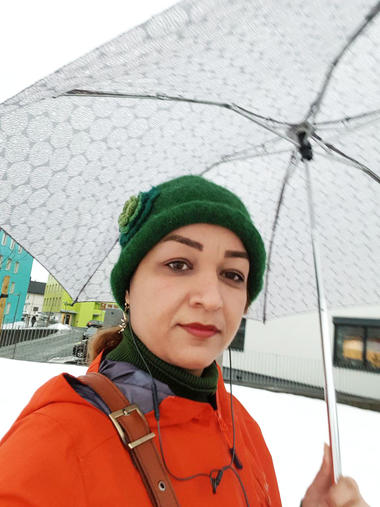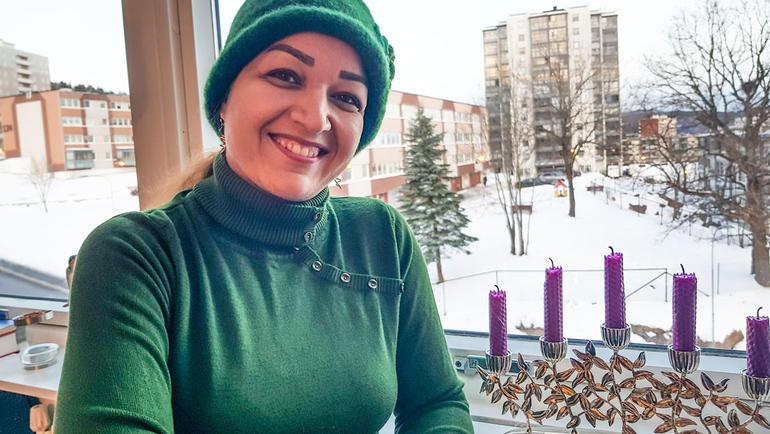Elaheh has worked as a language teacher in language schools and universities in Iran the past 17 years. She is also a PhD student in Teaching English as a Foreign Language (TEFL).
Her thesis is on formative assessment of writing. As a qualified PhD student, she was awarded a 65% grant by Iran’s Ministry of Higher Education to spend a six month sabbatical in Norway as formative assessment is being implemented in Utdanningsdirektoratet’s school curriculum.
"I had decided to spend part of my PhD research time outside Iran. Knowing that there was a grant for top PhD students, I needed to have a supervisor’s interest to cooperate and his invitation”, says Tavakoli.
"Defending my PhD proposal, I sent emails to the authors in my reference list and enquired their interest. Professor Tony Burner had written one of the closest articles to my work and I received his positive response immediately. That is how I found USN and was connected to the Faculty of Humanities and Educational Sciences”.
Highly productive stay in Norway
During her stay in Norway, Tavakoli has also observed classroom teaching in secondary schools, taught student teachers at USN and assessed student texts and oral exams.
“This experience at USN could help me gain a different perspective on how formative assessment can be the aim to pursue in a curriculum”, she says.
Tavakoli has attended PhD courses and seminars, wrote parts of her thesis, published articles related to her thesis and learned about Norwegian language and culture.
“This may seem a lot for seven months, I know, but I’m satisfied I could achieve it all. My only regret is losing the chance to attend two international conferences in the UK and not being granted extended stay in Norway”.
Tavakoli’s request for visa extension has been rejected by UDI.
Snow, Christmas and “dugnad” traditions
Tavakoli arrived in Norway a month before Christmas.
“Although I was welcomed by much snow, which of course I loved, it let me meet people at Christmas parties and learn a lot. I experienced Christmas Jul Markets and food (risgrøt tradition, pinnekjøtt, pepperkake, ring cake kransekake tradition, and many others). I could join Drammen international students’ Union (ISU) which could even expand my view of Christmas in many other parts of the world”.
Also, Tavakoli has been engaged in dugnad and language learning courses.
“Seeing how people in Norway practice dugnad to build a better Norway. I did not miss any chance of learning Norwegian and was fortunate to benefit from courses which were held based on people’s volunteering activities. I attended as many sessions of Språkafé in the Bibliotek and a church as I could”.
Multicultural around the table
These are new experiences to her, and she contrasts some of the things she observed in Norway with her home country Iran:
“It is amazing when you see a truly multicultural educational context. Syrians, Afghans, Kurds, Russians, Turkish and many other nationalities all sitting around one table and trying to learn a common language, each in their own way and each resorting to their first language translation with a partner from the same country. In these contexts, I did not see the didactic principles and language teaching methodologies utilized as I learned and taught in Iran, but the funny part was that learning was taking place”.
Tavakoli appreciated going out on tours, which is so easy and accessible everywhere in Norway.
“I tried cross country skiing, tours (Sæteren Gard, Lokkeråsen, Bessegen, Kjøsterudjuvet) and even ferry and sail boating, all of which built amazing memories I will never forget”.
Research group and student-led courses
“PASIE research group gave an incentive to work more on papers, read more critically and share opinions. It was also good as you could meet more researchers face to face or through Skype”.
Tavakoli also attended an ITEPS course, which was completely run with students’ involvement in spontaneous research, interviewing in class, analyzing the data and coming up with findings.
She adds: “And even more importantly, I enjoyed the way ITEPS students commented on one another’s performance”.
When asked about her impression of USN and campus Drammen, Tavakoli says:
“I found the administrators, lecturers, teachers and professors on the campus quite open, sociable, friendly and intimate to spend time with and learn from. It is truly inviting when they do everything they can to make you feel happy and feel a part of their community even though you don’t know their mother tongue. Celebrating different events, especially birthdays at the lunch table on the fifth floor and singing all together is something I will never forget."
Tavakoli says Drammen in some ways reminded her of home when she became a bit homesick:
“Drammen is not so big and populated but it is peaceful, quiet and convenient to live in. Any time I missed Isfahan, my hometown, I had a reminder here, walking up Spiralen reminded me of Sofe mountain, riding the bike along the river reminded me of cycling along Zayanderud, the formerly running river in Isfahan, and more importantly I have found many nice friends from around the world and even from Iran with whom I built sweet memories and I can keep contact”.
